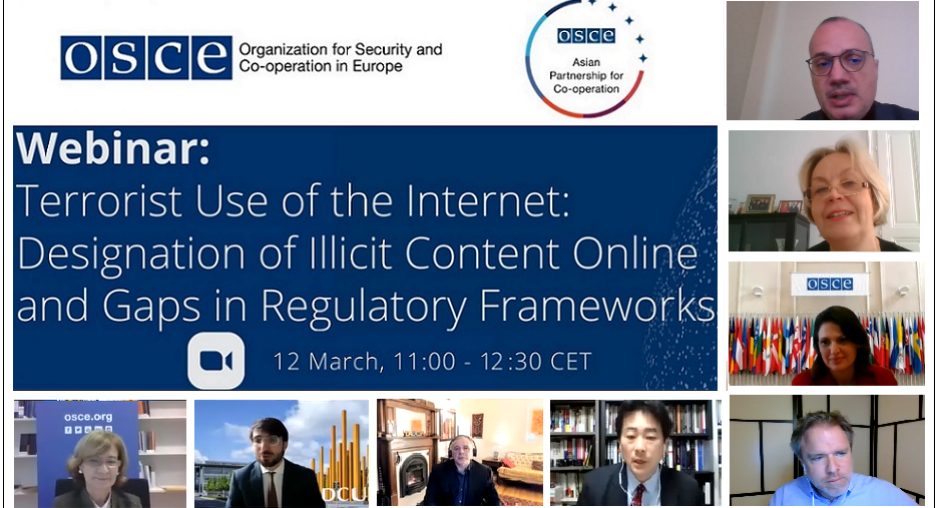OSCE furthers international discussion on terrorist use of Internet and related challenges on designation of illicit content online and gaps in regulatory frameworks

Over 180 participants, experts and high-level officials from around the OSCE region gathered for the OSCE webinar titled, “Terrorist Use of the Internet: Designation of Illicit Content Online and Gaps in Regulatory Frameworks”, held on 12 March 2021.
The online event was organized by the Action against Terrorism Unit of the OSCE Transnational Threats Department with the support of the Albanian Chair of the OSCE Asian Partners for Co-operation Group and the OSCE External Co-operation Section. It aimed to build on the OSCE roundtable discussion on Leveraging Innovation and Technology to Address 21st Century Security Challenges and Crises across the OSCE and Asian Partners for Co-operation held in November 2020.
Opening the event, Ambassador Igli Hasani, Chair of the OSCE Asian Partners for Co-operation Group said: “Building effective partnerships is crucial in our fight against terrorism. For our partnerships to be operational and meaningful, we need to co-operate beyond the layers of government and international organizational structures. As participating States, our fight against terrorism will only be as strong as our partnerships — building on mutual trust and pooling the resources between government agencies, civil society and the private sector.”
Alena Kupchyna, OSCE Co-ordinator of Activities to Address Transnational Threats, said: “The OSCE is committed to supporting efforts aimed at countering the use of the Internet for terrorist purposes. In pursuing all these efforts, we are striving to ensure that the benefits of new technologies are backed up with the necessary human rights safeguards, thereby furthering the OSCE’s comprehensive approach to security.”
The webinar provided a platform for participants to review and examine the current and emerging trends, key issues and gaps related to how states’ regulatory and policy frameworks designate illicit and terrorist content online, as well as how online platforms handle this through their “terms of service”.
Expert discussions elaborated on how initiatives that claim to address various forms of violent extremist and terrorist content online may negatively affect fundamental human rights.
Teresa Ribeiro, OSCE Representative for the Freedom of the Media, said in her keynote speech: “In practice, counter-terrorism and counter-’extremism’ approaches have proven to have far reaching effects upon media freedom across the OSCE region. Anti-’extremism’ laws, in particular, have been used to crackdown on journalists and others raising their voices in states across the region, in various ways, including for reporting or speaking out on matters in the public interest.”
The webinar panellists included representatives of the OSCE, as well as researchers and practitioners from think tanks and academia from Canada, Italy and Japan. They shared innovative practices and expert knowledge on designating and moderating violent extremist and terrorist content online. The important role of transparency, remedy and accountability measures in any pertinent legal and regulatory frameworks was also highlighted.
